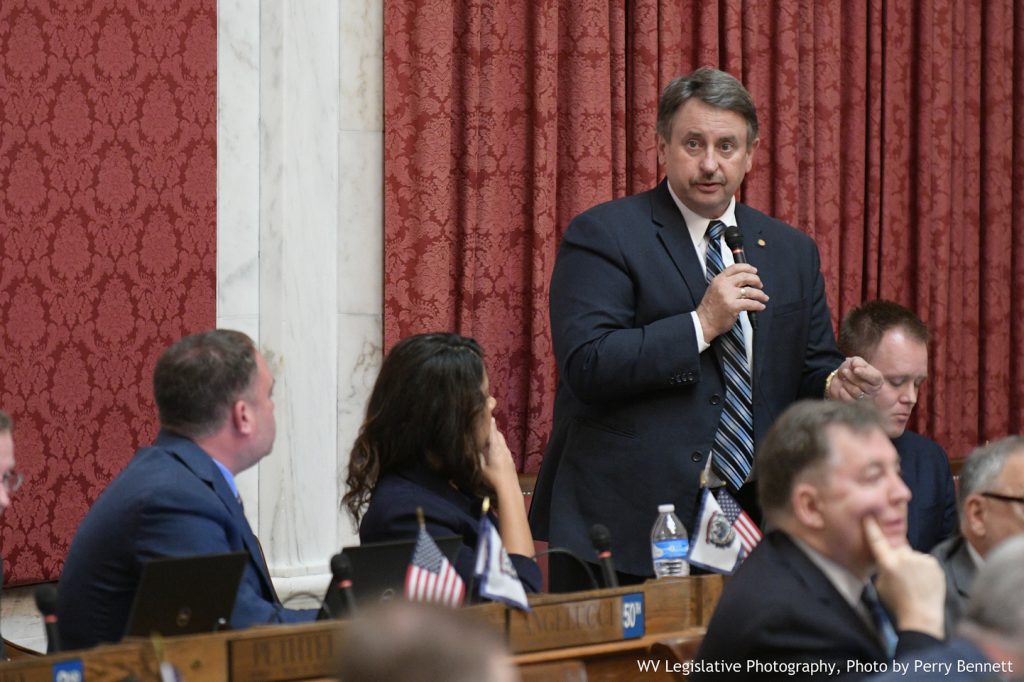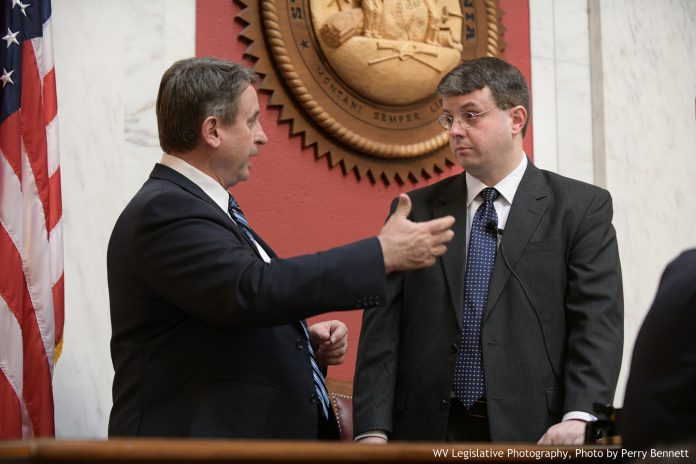“We Need to Treat Internet Like a Utility.”
A bill that overwhelmingly passed the House this week aims to encourage broadband expansion in the state.
House Speaker Roger Hanshaw, R-Clay, described the bill as critical, not only in providing people with a necessary service but also in enhancing West Virginia’s economy.
House Bill 2005, the Broadband Expansion Act of 2019, is the third in a series of broadband bills passed in the last three years.
This year’s bill focuses on wireless technology. Hanshaw explained it is difficult to quantify how many people would get access to broadband should the bill become law because the goal is more broad in making it easier for the private sector to expand.
“We need to treat internet like a utility,” Hanshaw said. “We treat water, sewer, telephone, and roads like true utilities and true instruments of commerce. In the 21st century, connection to a reliable internet service is a utility and it’s time to treat it like one.”
Hanshaw outlined the different facets of the bill. It incentivizes construction of wireless towers over the course of the next five years. The bill creates the Wireless Technology Business Property Valuation Act, which sets forth a method of evaluating valuation of wireless technology for tax purposes to reduce costs. The hope is that this would give developers incentive to construct wireless technologies.
The bill also authorizes small-cell facilities to be deployed around the state. Hanshaw said one carrier expressed a commitment of funding about $50 million in small-cell wireless facilities if the bill is signed into law.
Hanshaw explained the bill also authorizes the Public Service Commission (PSC) to take jurisdiction over laws related to pole attachment as opposed to the Federal Communications Commission, which currently oversees this.
“Right now, it’s all done by the FCC,” Hanshaw said. “If a state wishes to locally regulate, then it has to pass a bill like this. We are doing this to allow that regulation to happen locally.”
“States were only given that authority in the last eight months,” Hanshaw further explained. “Historically, this has been a federal regulatory regime only. There are lots of things like that where until the federal government gives up what is called preemptive authority and lets the state regulate that you’re stuck.”
Under the bill, power companies, which own many of the poles in West Virginia, would be required to study their infrastructure to see if they can connect broadband in what is called the “hot zone” of the pole. This is an area where electricity is run. Electric companies would run their own broadband fibers into this zone and then lease to telecom companies.
“Right now, that’s off limits, so utilities have to run below it,” Hanshaw said. “What this creates is essentially a hard stop on where the fiber can be run.”
“The way it’s set up is utilities are required to go to every home that wants it,” Hanshaw said. “That means they already have the pole network there. It’s already in place to put in fiber. This differs from telecommunications companies that would have to put a pole in the ground and make that investment. Power companies do this anyway because of Smart Meter reading for billing. They are running their own fiber anyway to all these homes. If they run their own fiber anyway, they can run a bit more and lease to telecom providers.”
This year’s bill, which focuses on wireless technology, builds upon two bills passed last year and in 2017. Last year, the Legislature passed House Bill 4629 and in 2017, the Legislature passed House Bill 3093. All three bills aim to lower barriers to let private companies expand services. However, some, including Delegate Brent Boggs, D-Braxton, are cautious about the bill. Although Boggs supported the bill and said he was happy to see it pass, he felt legislators should ensure that providers focus on rural areas.

“Historically, we’ve moved several of these initiatives forward over the years with limited success,” Boggs said. “It’s really important that anything we do lifts up all boats across the state, especially people in unserved or underserved areas.”
Boggs did not mention any problems specifically dealing with the bill but expressed his main issue as what he described as a need of continued monitoring.
“The bill is designed to do all of that but I want to make sure that carriers don’t just go for low-hanging fruit, leaving the more expensive and more challenging unserved and underserved areas,” he said. “Let’s do 5G and make sure that as we do that, we get people who have no service or are underserved too.”
Boggs said many people in his area have reached out to him about the need for broadband.
“I got an email from a lady who barely gets 1G service. She can’t send pictures. Her kid can’t do his homework,” he said. “It’s demoralizing. When they hear about this, they get excited but then feel like government has let them down later. That’s where we’ve dropped the ball over the years. We pass good things but don’t follow up to make sure that it’s benefitting people in our state.”
Boggs suggested having continuous monitoring conducted through interim committees so legislators can keep updated on progress made along with plans for future projects.
“We have an obligation to make sure that we hold carriers and all the parties to this bill accountable, including the PSC,” Boggs said. “The PSC has limited oversight but it’s something we need to look into as well.”
The Senate has referred this bill to Government Organization and then Finance.

